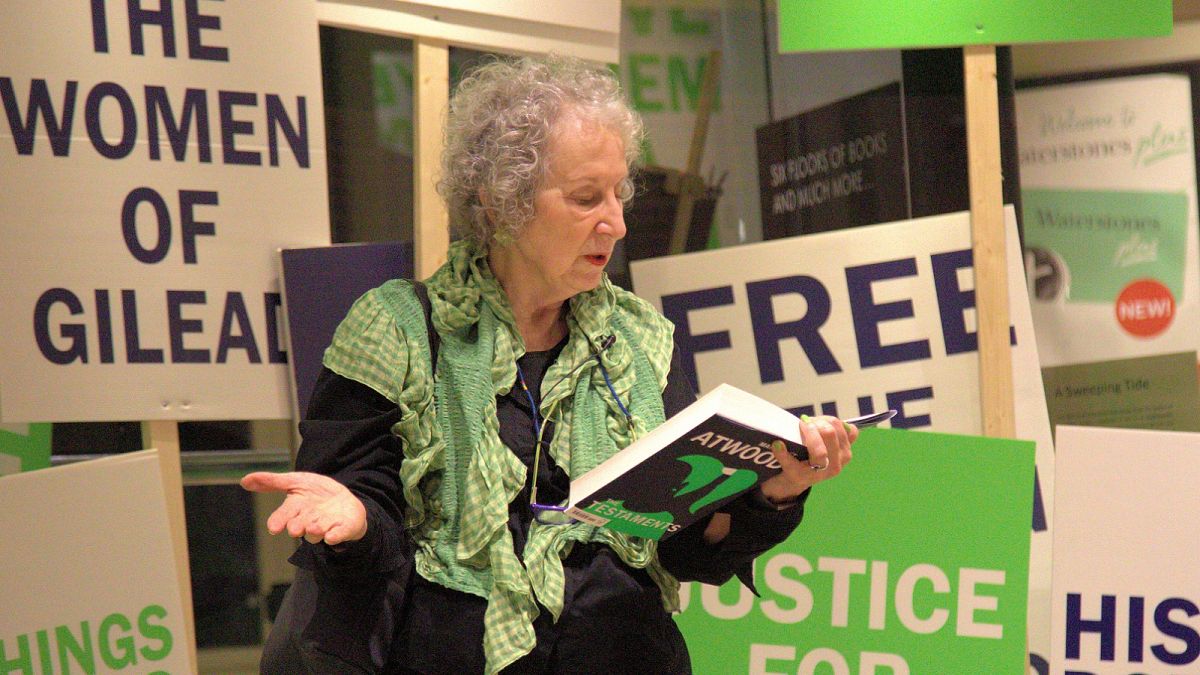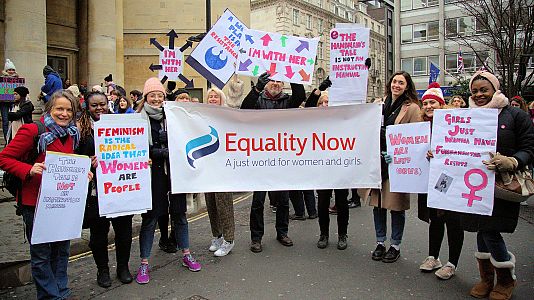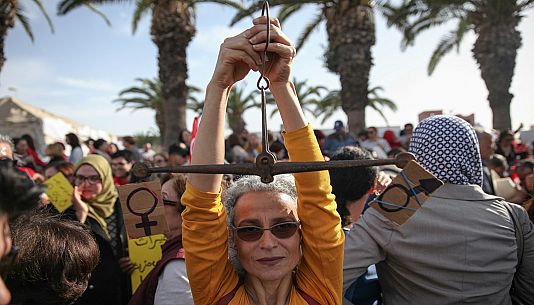As the world enters a new decade, the attitudes that normalise and legitimise sexual violence and oppression of women and girls, and assign to them rigid, stereotypical roles, remain far from fictional in January 2020.
In the fictional society of Gilead - the dystopian setting for The Handmaid’s Tale and The Testaments - human rights are severely restricted. Margaret Atwood’s prescient novel revolves around the sexual control of women. Fertile women are State property forced into sexual servitude to be ritually raped. Referred to as ‘handmaids,’ each is stripped of her identity and given a name signifying only her ownership by the man she serves.
As the world enters a new decade, the attitudes that normalise and legitimise sexual violence and oppression of women and girls, and assign to them rigid, stereotypical roles, remain far from fictional in January 2020. Deep-rooted sexism manifests in words, images, ideas and actions, permeating societies throughout the world as a mechanism to suppress the freedom of women and preventing them from fulfilling their potential.
Equality on the grounds of sex is an inalienable human right and the law is an important tool to promote sex equality because it communicates the values and beliefs of a society. A good law can and does promote equality and respect for all, and is important in achieving redress against violence and discrimination. Repeal of sexist laws and the implementation of laws promoting equality and justice are central to achieving gender equality.
Men-only jobs
Since laws communicate societies’ values, it is helpful to recognise the messages they send. For example, several countries forbid women from undertaking certain professions, claiming, as in China, that there are several jobs female workers should avoid or that women (contrary to men) must not work in “hard, dangerous and/or unhealthy trades.” These include - among 456 currently banned in Russia - driving trains, inspecting watercrafts in the fishing industry and being an aircraft mechanic.
The message is that women are weak and need protection. Men are strong and can tough it out. There are “pink” jobs and there are “blue” jobs, and movement between them is still largely unsupported in most cultures. Practically, men’s position in the workplace is preserved and women are kept in lesser roles with lower pay.
Nor are women paid equally for work of equal value. In the workplace, women are generally paid less, worth less. Worthless. This prevailing opinion of women’s capabilities is then carried forward in the work roles assigned; men hold the majority of highest level positions, including as lawmakers, judges and law enforcers, as well as in the media, where negative stereotypes of women are frequently mirrored and promoted.
Few countries have equal rights to parental leave when a child is born and fathers commonly have limited or no rights to parental pay. This means that women, particularly those on lower incomes, often have no choice but to fulfil the stereotype allotted to them as largely responsible for childcare. Men must be breadwinners and not take an equal share in caregiving. And men who break the norm and take more responsibility to bring up their children are frequently vilified and lose status.
Night work is also banned for women in some countries. This limits both whether a woman can find work and what kind of profession she could choose. Better to avoid being an Emergency Room doctor or transport engineer in case night work is required.
Why shouldn’t a woman work at night? It is because being independent and out at night is dangerous, whereas the home is safe. Given that belief, any woman venturing out is both inviting violence and flaunting her duty to be demure. By contravening this, she “deserves” anything that might happen to her.
Sexual violence
Practices over the centuries, from chastity belts to female genital mutilation (FGM), tell us that women must remain “chaste” and available only to their husbands. FGM has even been used against young American girls from communities where it is not widely practised as a response from parents anxious that their daughters might be touching themselves and developing a sexual identity under their own control.
And what if a woman is suspected of breaching the chastity rule? Again, the law in some countries reinforces a not uncommon view that it would be natural and understandable for a man to feel enraged if his wife, sister, mother or daughter is caught in an “illegitimate” sexual act and is barely to be blamed if he then kills or injures her.
Laws on sexual violence echo, enhance and reinforce these sentiments. Many crimes of rape require the use of additional violence and proof generally entails providing evidence of other injuries. The reasoning behind this is that if a woman didn’t fight back, she must have wanted sex.
This fails to recognise that rape is inherently violent and merely because someone doesn’t have obvious physical injuries doesn’t mean they haven’t been violated. It also doesn’t take into account unequal power relationships, fear, coercive control, the threat of violence, or whether someone has the capacity to give consent.
Conversely, what would a real victim do? She would want to hide her shame - she must, after all, remain “pure” - and one way of doing this would be to marry her rapist, which in reality only serves to perpetuate the stereotypes, sometimes exonerate in law the perpetrator and expose the survivor to an unwanted future where she will be subjected to further sexual violence and other abuses.
Another option is not to report the rape at all, for why would an “impure” woman want to draw attention to herself? Drinking too much alcohol or being out at night “proves” a woman’s easy virtue. We are told a woman is “safe” if she stays within her familiar environment (including not working at night), even though the vast majority of rapes are perpetrated by someone known to their victim, not a stranger.
Rape victims vilified by the judiciary
In the UK, rape complainants - but not rape accused - are being subjected to unfair questions about their past sexual history to sew the seed of their harlotry, which in turn renders them “undeserving” of justice.
As a consequence, women are more reluctant to report rape, which is then mistakenly seen as proof that nothing untoward has occurred. And if rape is “disappearing” from official records, so too are the specialist services to women survivors of rape, despite the ever-increasing actual demand for them.
To come full circle, statistics show that men aged 18 to 24 in England and Wales are consistently less likely to be found guilty of rape than older men on trial. According to the UK’s Crown Prosecution Service, juries appear particularly reluctant to punish young men at the start of their adult life for serious sexual assaults.
They do not want a young man to lose his job and go on the sex offenders’ register. Boys will be boys and their lives should not be ruined for “20 minutes of action” especially if they have a promising career ahead. They need to be breadwinners after all.
In many countries, marital rape is still explicitly permitted, even when the “wife” is still a child of 13 years of age. A woman must be obedient to her husband and he is entitled to have her, even if she is a minor.
Men’s state-sanctioned entitlement to sex
State-sanctioned prostitution is the ultimate manifestation of society’s acceptance and sanction of women’s inferiority to and dominance by men, as well as its particular disregard for the most vulnerable women.
In Germany, for example, and other countries that have legalised or fully decriminalised prostitution, prostituted women are available to satisfy men’s entitlement to sex. This state sanction not only reinforces the stigma against prostituted women as commodities to be bought and sold, and who tend to be the most desperate in society or trafficked from other countries when local supply is inadequate, but it confirms and legitimises the entitlement of men and so removes any stigma from them.
Prostitution has been characterised as a public service, suggesting there is a human right for men to have sex and reinforcing the stereotypes of men’s active, dominant, sometimes aggressive sexuality versus women’s compliance. Not surprising then that Glasgow & Clyde Rape Crisis asserts that “commercial sexual exploitation is inextricably linked with both the prevalence and the acceptability of sexual violence within our society.”
And even though a woman in prostitution is at high risk of sexual violence, the likelihood of her being able to claim justice through the legal system is very small.
All these laws send a message, drip by drip, to show women and men their place in society and to keep them there. To address stereotypes and their negative implications, all countries need a root and branch review of their laws and practices through a gendered lens. Respect needs to be taught to children at school through age-appropriate sex and relationship education that promotes equality and understanding about how it benefits both women and men. The 21st century is no place for handmaids.
- Jacqui Hunt is the Europe/ Eurasia Director at Equality Now, an international human rights organisation that promotes the rights of women and girls.
____________
Are you a recognised expert in your field? At Euronews, we believe all views matter. Contact us at view@euronews.com to send pitches or submissions and be part of the conversation.


